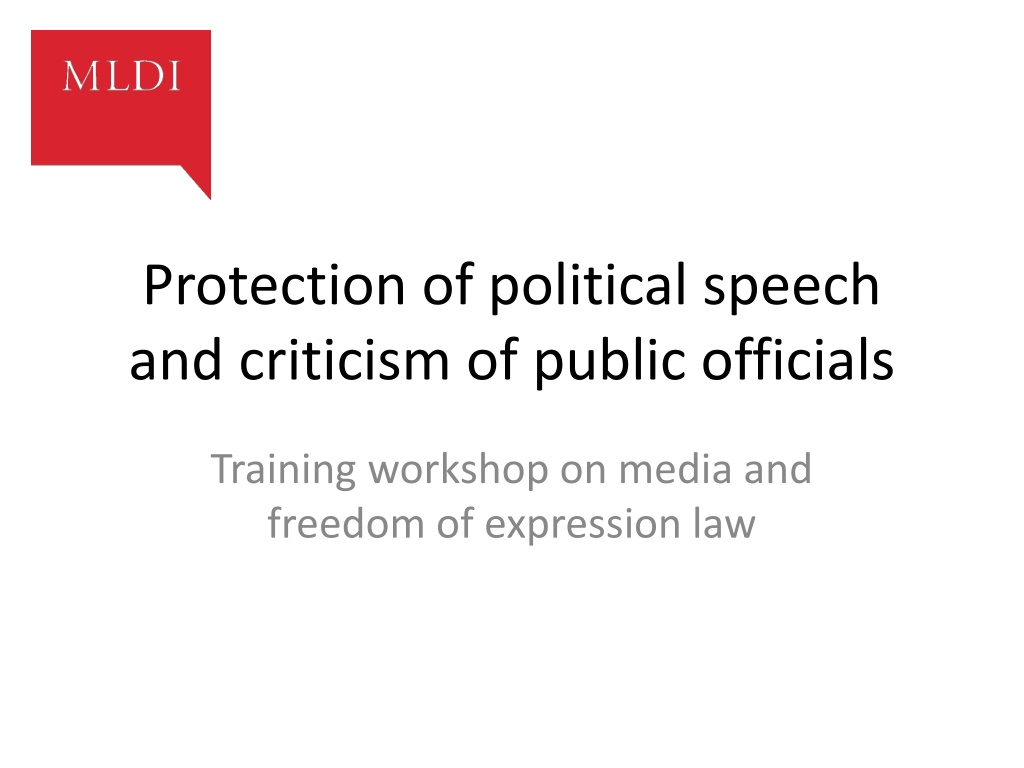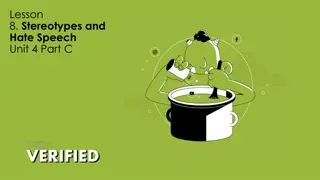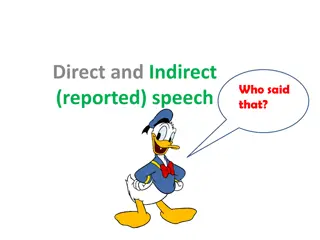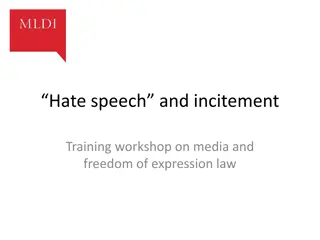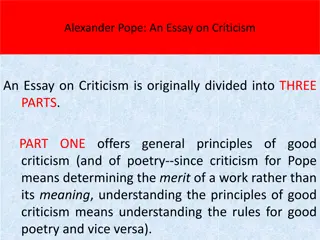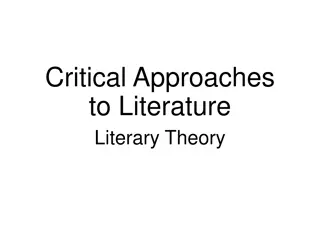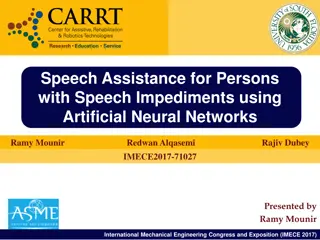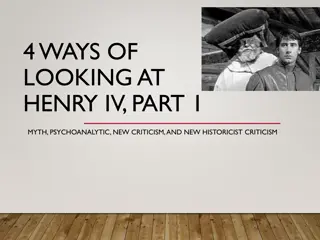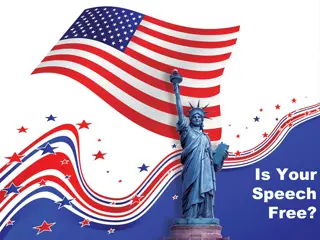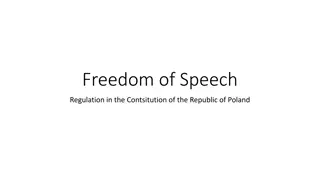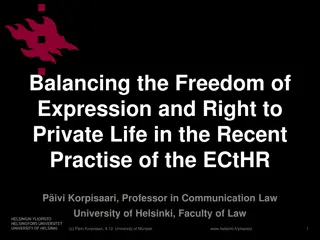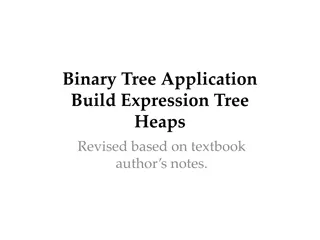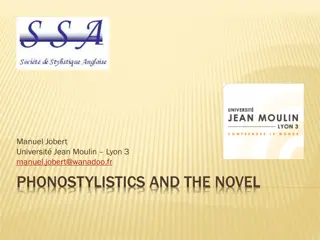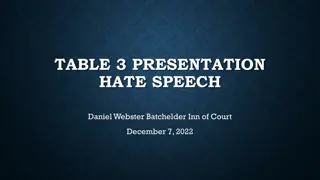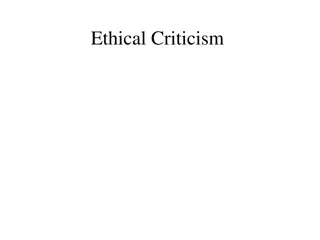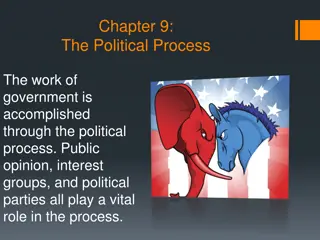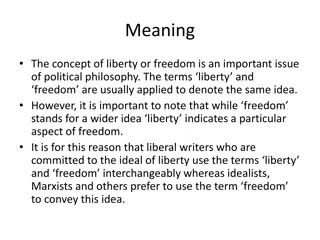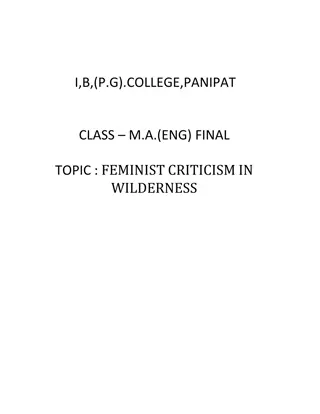Protection of Political Speech and Criticism: Ensuring Freedom of Expression for Public Officials
Understanding the importance of freedom of speech in political discourse, this workshop focuses on the legal framework protecting political speech and criticism of public officials. Highlighting the rights and responsibilities in democratic societies, the content emphasizes the necessity of open debate and scrutiny of public figures to maintain informed governance. Key legal principles from various jurisdictions stress the need for a balanced approach to criticism of politicians and public figures to prevent stifling public debate.
Download Presentation

Please find below an Image/Link to download the presentation.
The content on the website is provided AS IS for your information and personal use only. It may not be sold, licensed, or shared on other websites without obtaining consent from the author. Download presentation by click this link. If you encounter any issues during the download, it is possible that the publisher has removed the file from their server.
E N D
Presentation Transcript
Protection of political speech and criticism of public officials Training workshop on media and freedom of expression law
Freedom of political debate is at the very core of the concept of a democratic society. (ECtHR, Lingens v. Austria)
Freedom of speech and expression consists primarily not only in the liberty of the citizen to speak and write what he chooses, but in the liberty of the public to hear and read what it needs ... . The basic assumption in a democratic polity is that government shall be based on the consent of the governed. The consent of the governed implies not only that consent shall be free but also that it shall be grounded on adequate information and discussion aided by the widest possible dissemination of information from diverse and antagonistic sources... There must be untrammelled publication of news and views and of the opinions of political parties which are critical of the actions of government and expose its weakness. Government must be prevented from assuming the guardianship of the public mind. (Supreme Court of Sri Lanka, M Joseph Perera & Ors v. Attorney-General)
The importance of political speech is widely endorsed in judgments in different jurisdictions (the above being just two examples). What does this imply? Politicians (and other public figures) should be less protected from criticism than private citizens. Politicians (and those who report their words) should be protected in their speech.
[F]reedom of expression in a democratic society must be the subject of a lesser degree of interference when it occurs in the context of public debate relating to public figures. Consequently, as stated by the [African] Commission [on Human and Peoples Rights], people who assume highly visible public roles must necessarily face a higher degree of criticism than private citizens; otherwise public debate may be stifled altogether. (ACHR, Konat v. Burkina Faso)
The [politician] inevitably and knowingly lays himself open to close scrutiny of his every word and deed by both journalists and the public at large, and he must display a greater degree of tolerance, especially when he himself makes public statements that are susceptible of criticism. (ECtHR, Oberschlick v. Austria)
Point for discussion It may be that politicians should be open to criticism. But is it really true that all public figures have voluntarily exposed themselves to defamatory falsehoods or intrusion into their private lives? If your chosen profession is to be an actor or even a prominent lawyer does that mean you are fair game? What are the arguments for and against?
The limits of permissible criticism are wider with regard to the Government than in relation to a private citizen, or even a politician. In a democratic system the actions or omissions of the Government must be subject to the close scrutiny not only of the legislative and judicial authorities but also of the press and public opinion. (ECtHR, Castells v. Spain)
It follows from this that the government or state bodies should not be able to sue for defamation. This is the position now taken in many jurisdictions. The Human Rights Committee calls for an end to the offence of defamation of the State.
Point for discussion In the famous McLibel case, the fast food company McDonald s sued two British environmental activists for libel, for circulating a pamphlet criticizing the company s practices in sourcing their meat. The two activists had no legal representation for most of the proceedings since free legal aid is not available for libel cases in a case that became the longest libel case in British legal history. McDonalds won, but the activists took their case to the European Court of Human Rights. The Court found a violation of Article 10 because there was: A lack of procedural fairness An excessive award of damages No equality of arms between the parties Should corporations be required to develop the same thick skin as politicians and tolerate vigorous criticism in the public interest?
Hypothetical case for discussion A newspaper publishes an article about the record of a senior judge. It is based upon documents from the past, when the country was under dictatorial rule. The documents appeared to show that the judge had prosecuted opposition political prisoners, securing the death penalty in a number of cases. The judge sues for defamation. He is able to demonstrate that the prosecutor in the newspaper article was not himself, but another lawyer of the same name. He has documentary proof that he was living outside the country at the time.
In addition to political speech, other speech and reporting is protected in the public interest. The ECtHR has applied the public interest standard in cases involving issues such as police brutality (Thorgeirson) and seal hunting (Bladet Tromso).
The South African Supreme Court of Appeal explained the protections as follows: [W]e must not forget that it is the right, and indeed a vital function, of the press to make available to the community information and criticism about every aspect of public, political, social and economic activity and thus to contribute to the formation of public opinion. The press and the rest of the media provide the means by which useful, and sometimes vital information about the daily affairs of the nation is conveyed to its citizens from the highest to the lowest ranks. Conversely, the press often becomes the voice of the people their means to convey their concerns to their fellow citizens, to officialdom and to government. (National Media Ltd and Others v. Bogoshi)
Point for discussion What is the public interest? How does it differ from what interests the public? How would you construct a public interest argument in defence of a story on, for example, scandals in the private life of a politician?
